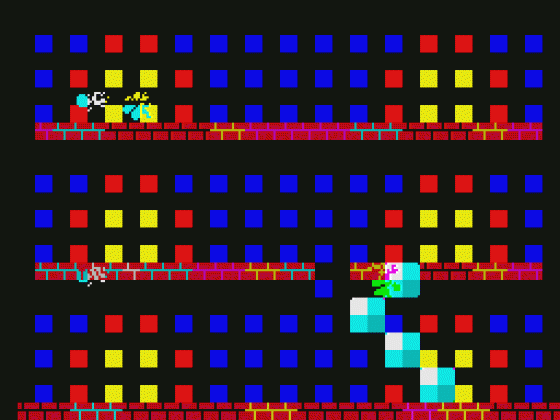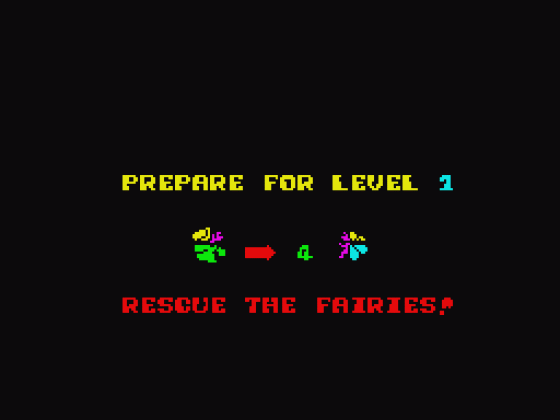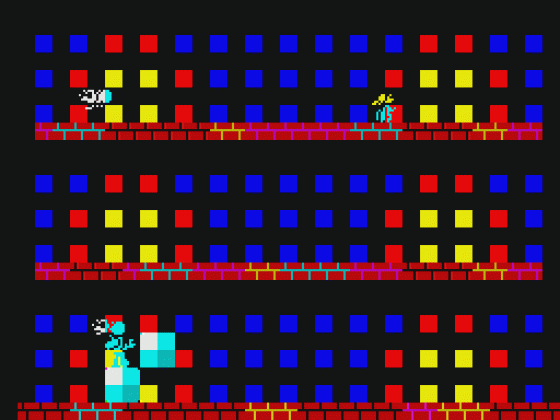
Everygamegoing
 31st December 2019
31st December 2019
Categories: Review: Software
Author: Dave E
Publisher: Monument Microgames
Machine: Spectrum 48K/128K
Nice music, shame about the game!
Castle Capers
Uh oh, the latest Spectrum release from Gabriele Amore has just landed on my desk. His "conversion" of the arcade Popeye was an abomination and his Pengi-clone Pengo Quest was decidedly odd in both execution and premise, so my hopes weren't high for Castle Capers. But, at least I consoled myself as I loaded it in, there are some instructions with this one. Fairly limited instructions, but we'll come to that, but instructions nevertheless. His previous games have left the player to work out what to do himself.
The game is set in a fairy-tale platform world ruled by the Evil Mouse King. There are a number of screens to complete which are all patrolled by the King's patrolling minions, and you have only your skill with the placements of blocks to rescue the fairies from each of them. You move a wizard-looking character around each platform and can only go left, right or create a block directly in front of you; if you do this, it will appear in the direction in which you're currently facing.
Oddly, the instructions inform you that you have infinite lives - apart from when you reach the final confrontation with the Mouse King. Having played games like Solomon's Key (on the Spectrum) and Breakthrough (on the BBC), my initial thoughts were, at this point, how hard can this be?

Well, I soon not only found out... but also gained myself another Gabriele Amore game to hate. What the instructions hadn't pointed out was exactly how to use that "create a block/create hole" control. Tap it, and a block (the same size as your wizard) does indeed appear - and tap it again and it does indeed disappear too. So, sharpish considering the patrolling minions jerkily steaming toward me, I created a block, stepped onto it, created another one, stepped onto that, created a third and stepped out of harm's way onto the platform above. The fairy gliding back and forth on this platform ran into me - all good - and another one then appeared on the platform below.
Which left me unable to complete the screen.
How could I remove the blocks below me? It wasn't possible. Tapping that "create a block/create hole" would only create further blocks, leading me further and further up the screen until I became trapped at the very top. How was I supposed to use it to create holes? There were no clues in the instructions but fortunately a quick visit to YouTube revealed that holes were created by placing the block in front of overhead platforms, and then removing it. You see, removing the block doesn't just remove the block itself, but the platform too, which creates the holes that you need to drop through if, later, a fairy is milling about on one of the platforms below you.

Aha! Back to the game I went, hoping that the frustrating feeling that "Well, this can't be right; I must not be playing it properly," would now go away. It didn't. It was replaced by the frustrations of the game itself.
Firstly, Gabriele Amore clearly builds all of his games with the same tools - and so they are always jerky, and the sprites are always the same sizes. The same criticisms I've levelled at his previous efforts therefore apply in equal measure to Castle Capers.
Here, instead of your wizard being able to run and jump enemies, he's got blocks to construct, and holes to create. Any player therefore needs a bit of time to study the screen layout beforehand, or needs the game to run at a reasonable speed that he can place blocks to strategically avoid the enemies and consider the bigger picture of getting from A to B simultaneously. Castle Capers doesn't give you nearly enough time to think about what you're doing before you have to do it simply to prevent a collision.

I'd also take issue with the blocks in Castle Capers not being giant ice cubes, as they possess the same level of adhesiveness. Create one, step onto it, and forget to jerk forward into its very centre, and you'll slip backwards off it as you create another one! Create two vertically-aligned blocks and you'll teleport up them when you stand on the one at the very bottom.
Baddies, of which there are many, have varying degrees of movement and intelligence. Some just move jerkily left and right in set patterns; others bounce too, meaning they can reach you even if you're between platforms on a block or, if they bounce high enough to come through the floor, even on the platform above. Yet others ascend or descend passages of blocks you've created, and fall through the holes you've made. Without exception, they all move slightly faster than you do, meaning once one's on your tail, you can't hope to outrun it or even scramble to safety. It's at this point that you begin to understand why you're given infinite lives. If this booted you back to a title screen, you've never be bothered to start a subsequent game!
Screen layout is aesthetically unpleasing. The Spectrum always suffers from colour clash, so programmers compensate for it by having cute-but-monochrome sprites, or dispensing with backgrounds. Doing this means the player can see what's going on, and indeed Amore's Pengo Quest seemed to have grasped this. Castle Capers therefore seems like a step backwards, because there's a whole lot of colour clash going on - when enemies glide through or over the blocks you've created, they almost seem to temporarily disappear.
I'm racking my brain for something - anything! - positive to say about Castle Capers. A typical game involves scooting out of the way of an approaching nasty - off one side of the screen and onto the other because it has wraparound - and constructing a 'staircase' of blocks until you reach an overhead platform. At that point you need to remember to 'remove' the block you place in front of it to create a hole. Then you must retreat down your staircase and create a branch of it that avoids filling in the hole you've created. Then you rinse and repeat that formula on each platform to reach the next one. When you've collected your quota of fairies you proceed to the middle of the top-most platform and continue to the next screen. All of that does take some skill and, if you've got a Spectrum 128K, it's accompanied by some very snazzy in-game music.
Amore was probably hoping to create a cutesy platformer to tax the brain. But the game itself is so dated, basic and samey that you won't pick it up more than once. Solomon's Key is head and shoulders above this mess, and it's over 35 years old now. Check it out if you must - it's probably just about worth it for the music.



















